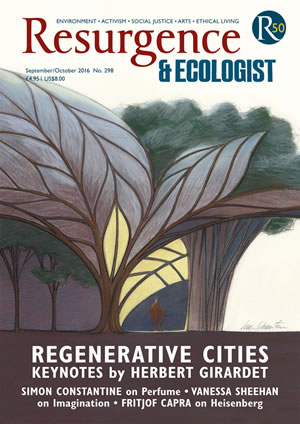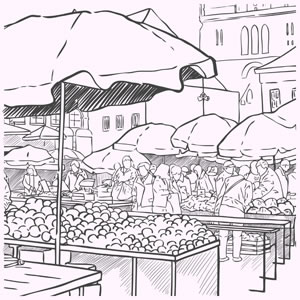“Wherever something is wrong, something is too big.” ― Leopold Kohr
Most of us reject generalisations. We recognise that the real world is complex, messy and full of contradictions. We’re understandably sceptical of one-size-fits-all solutions, and wary of people who stand on a soapbox saying, “I have the answer!” For these reasons I have found myself in a rather difficult situation as I have travelled the world promoting a simple formula to solve most of the crises humanity faces.
For 40 years, I have been banging the drum for economic localisation. For me, almost all the major problems in the world today – from climate change to uncontrolled migration, species extinction to terrorism – have been caused, or at the very least exacerbated, by economic globalisation. Decentralising economic activity – in other words, reducing the distance between production and consumption – can in one fell swoop begin to turn things around.
The beauty of localisation is that it reflects and celebrates diversity. It is responsive to the needs of different environments, respectful of different cultures. It is life-enhancing, empowering, democratic and ecological. It is organic, place-based, in tune with the infinite fluidity of Mother Earth. It is not one giant solution imposed from above, but countless micro-solutions emerging from below.
I am a passionate advocate of localisation largely because of my experiences in the Himalayan regions of Ladakh, or ‘Little Tibet’, and Bhutan. There I witnessed first-hand the devastating impact of economic development on Nature-based traditional cultures. I came to see how our economic system centralises power and creates intense competition for artificially scarce educational opportunities and jobs, while at the same time reaching deep into the psyches of young children, perverting a universal need for love and acceptance into a need to consume. This proved a deadly combination, leading within a short period to depression and suicide, violent conflict, and the destruction of Nature.
It became clear that the modern economy was an embodied generalisation – a globalised market that destroys diversity, both ecological and cultural. I also came to realise that many well-intentioned people were inadvertently supporting an economic system that not only is environmentally destructive, but also ultimately threatens their own wellbeing. Ideas about progress, education, individualism and democracy had been transformed into blind support for economic growth and development; idealism and goodwill had ended up in the service of a vast global system based on mindless waste, consumerism, unemployment and insecurity.
It didn’t have to be this way: the seeds for a healthier economy had already been planted by the environmental movement of the 1970s. An understanding of the importance of economic scale was central to this movement, which found inspiration in the book The Limits to Growth and the seminal writings of Rachel Carson and E.F. Schumacher. These works galvanised a rising demand for fundamental change to the economy – for human-scale, decentralised development based on renewable energy. This was coupled with the realisation that we needed a much more holistic, interdisciplinary approach in education and science. At the time, environmentalists were also very clear that what was needed was structural, systemic change, not piecemeal reforms.
But even as environmentalists spoke of human-scale economies, the economic scale kept growing. After the second world war, well-intentioned statesmen supported the notion that integrating all the world’s economies was the best way to avoid another war and another depression. In this spirit, the General Agreement on Tariffs and Trade (GATT), the International Monetary Fund (IMF) and The World Bank were set up to spur trade, economic growth and Third World ‘development’. A global monoculture was beginning to envelop the planet, propelled by the deregulation of trade and finance via ‘free trade’ agreements.
Concern about environmental problems didn’t go away, but over the decades the giant corporations and media conglomerates that pushed for deregulation and ‘free trade’ gained so much wealth and power that they were able to shape not only government policy, but also public opinion and intellectual discourse. Rather than system change, the focus was now on individual change. Even as sophisticated advertising campaigns encouraged further consumption in both North and South, we were told that innate human greed and wastefulness were the cause of environmental breakdown. And if individuals were the problem, they were also the solution: we could save the planet by changing our light bulbs, turning down our thermostats, and driving less. As corporate funding flowed to environmental organisations, many of them shied away from promoting economic change, decentralisation, smaller scale or localisation. ‘Sustainable development’ – a euphemism for business-as-usual – became the new buzzword, and ‘market solutions’ like green consumerism, ethical investment and carbon trading were widely embraced. Meanwhile, thanks to deregulatory trade agreements, global production and transport were increasing exponentially – along with greenhouse gas emissions, resource depletion, unemployment in the North and poverty in the South.
It is my conviction that we ended up in this situation not because of ill will, but primarily because of ignorance – a lack of understanding that extends from the grass roots to the corridors of power. There is a de facto structural conspiracy in which large-scale economic activity demands narrow specialised expertise, and few can see the bigger picture. That big-picture perspective would reveal that the scaling-up of the global economy is leading to massive breakdown – social, economic and ecological.
The juggernaut of deregulation still continues. Its newest and perhaps most damaging manifestation appears in the form of the Trans-Pacific Partnership (TTP) and the Transatlantic Trade and Investment Partnership (TTIP). Both include clauses that allow corporations to sue governments over laws – including those that protect human rights and the environment – that may diminish their future profits. However, in the last couple of years resistance to the treaties that underpin our destructive global economy is definitely on the rise.
At the same time, ongoing economic instability and inequity have increased public awareness of the need for fundamental change to the economy. In the last 20 years, in fact, the world has witnessed an amazing increase in localisation initiatives. Local food has become nearly mainstream, and whole towns have decentralised their electric power supply. In a growing number of places it’s considered a citizen’s responsibility to support local businesses. The localisation movement has become so popular that multinational corporations – from Walmart to junk food conglomerate Frito-Lay to global bank HSBC – are trying to cash in by highlighting their supposed ‘local’ attributes.
While the strides made by the emerging localisation movement are heartening, we still have a long way to go before they add up to genuine system change. The scale of the economy continues to grow, as it amalgamates diverse cultures into one enormous and polluting monoculture. The path towards localisation means working together to tackle this system at the policy level, while continuing to create and nourish the multitude of grass-roots projects.
So how do we move forward from here? What steps are necessary to further strengthen local structures in the face of continued top-down globalisation? How can we move towards the kind of future that Resurgence has championed – one in which the essential connections between ‘soil, soul and society’ are recognised and honoured?
From my point of view, we need to focus on getting the big-picture perspective out much more widely. Currently, most individuals and organisations are still working in their own ‘silos. Some important cross-issue collaborations have emerged, such as climate justice, but for the most part those working on climate change don’t link up with those working on poverty, toxic waste, species extinction, ethnic conflict or global trade. Yet the economy links all of these.
To fundamentally reduce the scale of the economy, we need to address the policies that have enabled corporations to amass so much economic and political power. Trade treaties need to be renegotiated to enable societies to limit the movement and power of global banks and corporations. Taxes and subsidies need to be shifted to favour rooted businesses that offer stable and meaningful employment, and have a smaller ecological footprint.
Policy changes would reduce the distances between producers and consumers, enabling us to see more clearly the impact of our actions on others and on the natural world. In the current system, it is as if our arms have become so long that we can’t see what our hands are doing: it is nearly impossible to make informed decisions when everything from our food to our electricity is produced thousands of miles away. To make choices that are not destructive, we need much closer connections to others and to the natural world.
It is clear that more and more people are developing a longing for these connections. They recognise that it is crucial that we slow down and become intimately acquainted with the place where we live. They are beginning to rediscover and develop localised knowledge systems: as the poet Gary Snyder says, “one has to start where one is and become nature-literate to the scale of the immediate home place.”
While we are localising our economies, it is important to simultaneously strengthen our global connections. Localisation does not mean isolationism: on the contrary, the policy steps needed to localise economic activity require international collaboration, and the new binding treaties we need to protect human and ecological wellbeing demand cross-border cooperation. At the grass roots, as well, we urgently need to share information about what works and what doesn’t – within communities, within nation-states, and internationally.
Unless there is massive pressure from below – a united movement that knows what it is for and what it is against – our political leaders are unlikely to make the policy shifts needed: they are besieged by corporate lobbyists, showered with big-money campaign contributions, and transfixed by the assumption that they must increase global trade to solve the problems we face. But grass-roots mass movements are already under way. One that is finally getting the recognition it deserves is La Vía Campesina: representing more than 200 million small farmers worldwide, it can easily be considered the biggest eco-social movement of our time.
Localisation may sound like a one-size-fits-all solution, but it is in fact the opposite: it is a process of adapting economic activity to diverse places and people, with all their messy complexities. I call it ‘bringing the economy home’, and the benefits go far beyond what we would ordinarily consider economic. In both the global North and South, local economies not only help ensure greater job security, prosperity and income equality: they also provide the framework needed to support strong communities, which in turn support the health of the individual, psychologically and physically. Ultimately, localisation renews our connections to one another, to our communities, and to the living world around us. It satisfies our deep longing for purpose, belonging and a secure future for ourselves and our children.







